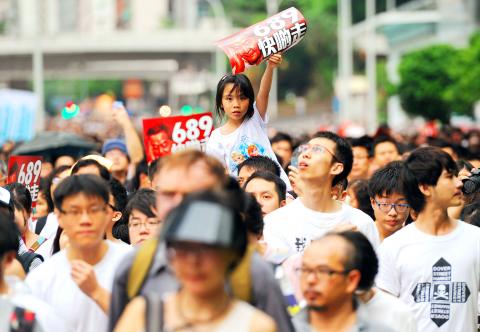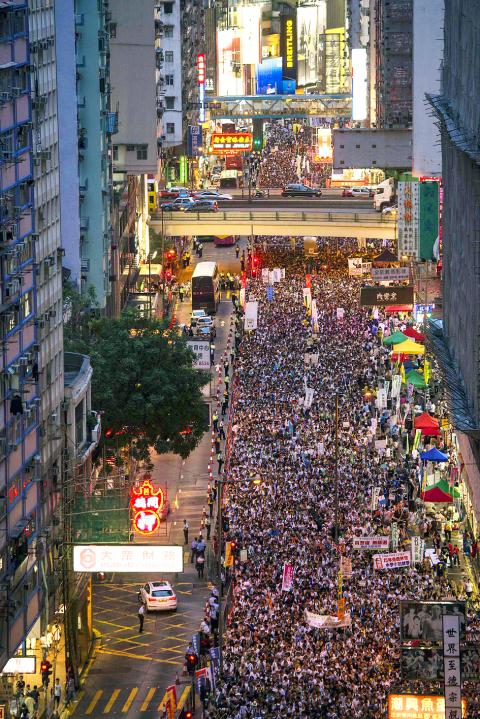Tens of thousands of pro-democracy protesters marched in Hong Kong yesterday, with many calling for the territory’s leader to be sacked, in what could turn out to be the biggest and most passionate challenge to Chinese Communist Party rule in more than a decade.
Hong Kong Chief Executive Leung Chun-ying (梁振英) said his government would do its “utmost” to move toward universal suffrage and stressed the need for stability after nearly 800,000 voted for full democracy in an unofficial referendum.
Tensions flared early as activists from the League of Social Democrats burned a copy of a “white paper” released by Beijing last month that reasserted the central government’s authority over the former British colony, enraging many. The group also burned a portrait of Leung.

Photo: AFP
Security was tight with tension running high among pro-democracy activists after the referendum highlighted the deep divide in the territory of more than 7 million people. Aerial shots showed key arteries packed with marchers.
Roads were closed off around Victoria Park, a small, green oasis named after the former British queen, where the rally started as demonstrators marched to the central business district surrounded by police.
“I think the people’s wish on this vote is very clear and they are not taken in by recent suggestions that we should pocket whatever we are offered in the hope that more would come later. This is just rubbish,” said Anson Chan (陳方安生), Hong Kong’s former top civil servant and a key supporter of the unofficial referendum.

Photo: Reuters
Organizers of the annual rally, marking the day the territory returned to China in 1997, were expecting the largest turnout since 2003, when half a million people demonstrated against proposed anti-subversion laws which were later scrapped.
Then-Hong Kong chief executive Tung Chee-hwa (董建華) stepped down in March 2005, nearly two years before completing his second five-year term.
“I think in view of the vote of almost 800,000 people in favor of democracy, real democracy, not the type of democracy Beijing is suggesting, that today is probably going to be one of the most pivotal moments in the history of the democratic movement in Hong Kong,” said lawyer Sean Leonard, from the think tank HKU International Institute of Financial Law. “It’s about time Beijing woke up.”
Pro-democracy groups are demanding greater democracy in elections for the territory’s chief executive in 2017.
Chinese authorities are keen to ensure that only pro-Beijing candidates make it on to the ballot. Democracy activists want the nomination process to be open to everyone.
Hong Kong returned to China with wide-ranging autonomy under the formula of “one country, two systems,” allowing such protests to take place, but China bristles at open dissent, especially over sensitive political matters such as demands for universal suffrage and the annual June 4 vigil in Hong Kong remembering the Tiananmen Square Massacre in Beijing in 1989.
In Beijing, Chinese Vice President Li Yuanchao (李源潮) urged a visiting Hong Kong youth group yesterday to make sure young people “staunchly uphold one country, two systems” and “pass on the fine tradition of patriotism and loving Hong Kong,” Xinhua news agency reported.
Beijing’s Liaison Office in Hong Kong went further.
“We are firmly against the radical and illegal activities launched by very few people, because we all have responsibilities to defend the bottom line of law which Hong Kong people cherish,” office head Zhang Xiaoming (張曉明) said in apparent reference to the referendum and planned protests.
“Central government firmly supports the universal suffrage in Hong Kong, and its sincerity and determination is unswerving. This kind of sincerity and determination won’t have any change or shake because of the so-called referendum or the scale of the march,” Zhang said.

CHAOS: Iranians took to the streets playing celebratory music after reports of Khamenei’s death on Saturday, while mourners also gathered in Tehran yesterday Iranian Supreme Leader Ayatollah Ali Khamenei was killed in a major attack on Iran launched by Israel and the US, throwing the future of the Islamic republic into doubt and raising the risk of regional instability. Iranian state television and the state-run IRNA news agency announced the 86-year-old’s death early yesterday. US President Donald Trump said it gave Iranians their “greatest chance” to “take back” their country. The announcements came after a joint US and Israeli aerial bombardment that targeted Iranian military and governmental sites. Trump said the “heavy and pinpoint bombing” would continue through the week or as long

TRUST: The KMT said it respected the US’ timing and considerations, and hoped it would continue to honor its commitments to helping Taiwan bolster its defenses and deterrence US President Donald Trump is delaying a multibillion-dollar arms sale to Taiwan to ensure his visit to Beijing is successful, a New York Times report said. The weapons sales package has stalled in the US Department of State, the report said, citing US officials it did not identify. The White House has told agencies not to push forward ahead of Trump’s meeting with Chinese President Xi Jinping (習近平), it said. The two last month held a phone call to discuss trade and geopolitical flashpoints ahead of the summit. Xi raised the Taiwan issue and urged the US to handle arms sales to

State-run CPC Corp, Taiwan (CPC, 台灣中油) yesterday said that it had confirmed on Saturday night with its liquefied natural gas (LNG) and crude oil suppliers that shipments are proceeding as scheduled and that domestic supplies remain unaffected. The CPC yesterday announced the gasoline and diesel prices will rise by NT$0.2 and NT$0.4 per liter, respectively, starting Monday, citing Middle East tensions and blizzards in the eastern United States. CPC also iterated it has been reducing the proportion of crude oil imports from the Middle East and diversifying its supply sources in the past few years in response to geopolitical risks, expanding

An Emirates flight from Dubai arrived at Taiwan Taoyuan International Airport yesterday afternoon, the first service of the airline since the US and Israel launched strikes against Iran on Saturday. Flight EK366 took off from the United Arab Emirates (UAE) at 3:51am yesterday and landed at 4:02pm before taxiing to the airport’s D6 gate at Terminal 2 at 4:08pm, data from the airport and FlightAware, a global flight tracking site, showed. Of the 501 passengers on the flight, 275 were Taiwanese, including 96 group tour travelers, the data showed. Tourism Administration Deputy Director-General Huang He-ting (黃荷婷) greeted Taiwanese passengers at the airport and